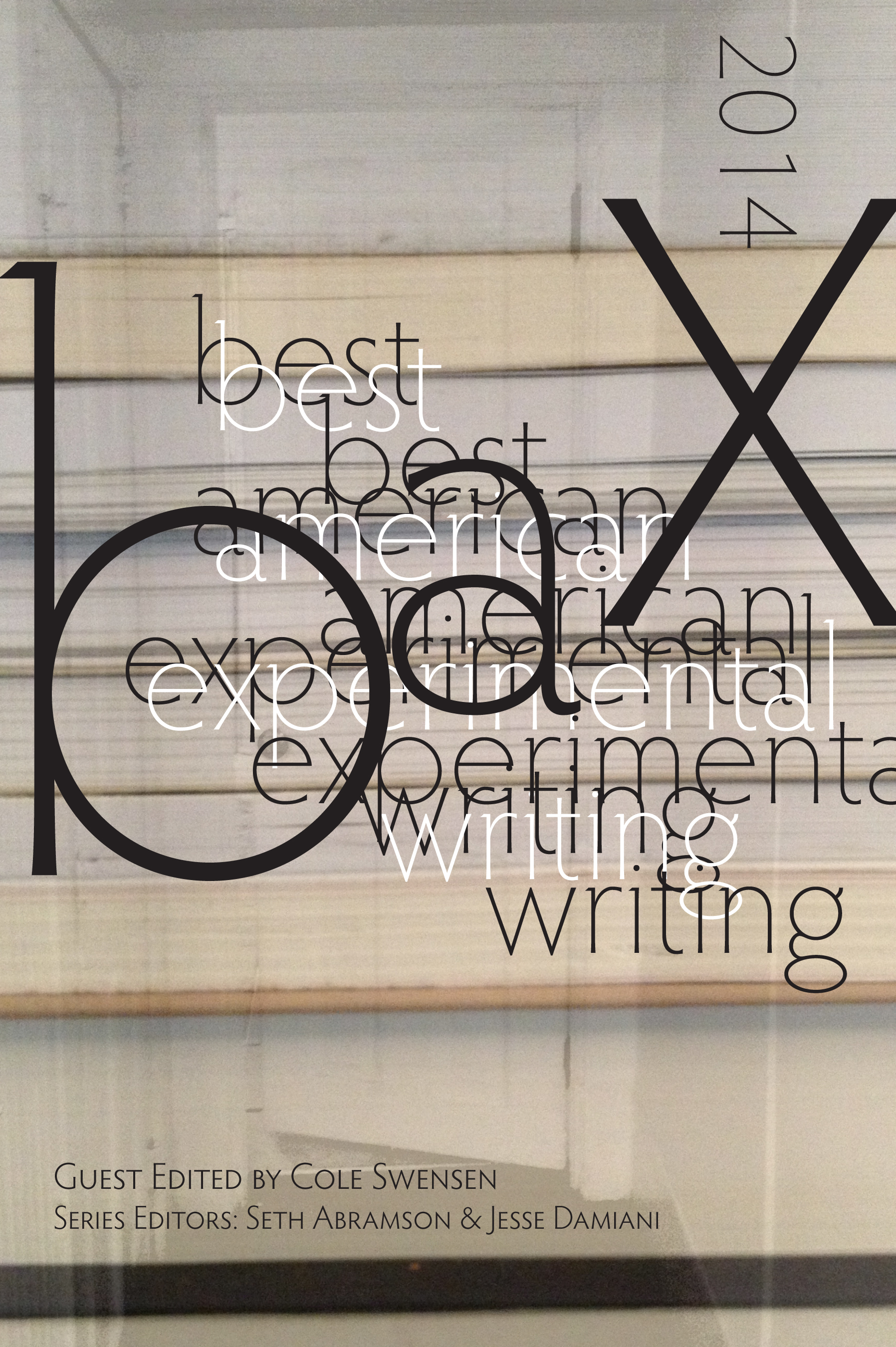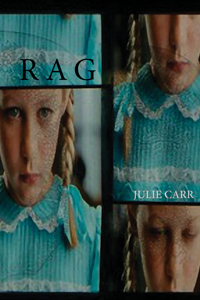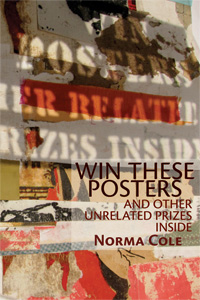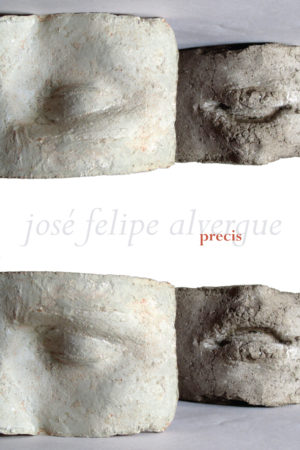Description
Series Editors:
Seth Abramson & Jesse Damiani
Guest Editor: Cole Swensen
Best American Experimental Writing compiles the best writing inspired by an experimental ethos written in North America in 2013. It features 75 works by a diverse range of emerging and established writers. The anthology is a vital teaching tool and a must-read for anyone interested in innovative concepts. Series Co-Editors are Seth Abramson and Jesse Damiani; Cole Swensen is the 2014 Guest Editor.
Subsequent issues of BAX will be published by Wesleyan University Press.
Contributors:
[column3] Emily AbendrothCarmen Aiken
Toby Altman
Rae Armantrout
Rebecca Bates
Charles Bernstein
Mei-Mei Berssenbrugge
Nathan Blake
Amaranth Borsuk
John Bradley
Hannah Brooks-Motl
Robert Bruno
C.S. Carrier
Ken Chen
Maxine Chernoff
John Coletti
CAConrad
Kathryn Cowles
Monica de la Torre
Brett DeFries
LaTasha Diggs
Kate Durbin
Peter Eirich
Lisa Fishman
Andy Fitch
Ossian Foley
Logan Fry
[/column3] [column3_mid] Colin Fulton
Forrest Gander
Angela Genusa
Lara Glenum
Judith Goldman
David Gorin
Kate Greenstreet
Brenda Hillman
Kevin Holden
Harmony Holiday
Janis Butler Holm
Darrel Holnes
Melanie Hubbard
Kathleen Janeschek
Lisa Jarnot
Andrew Joron
Douglas Kearney
Daniel Khalastchi
Paula Koneazny
Jennifer Kronovet
Ann Lauterbach
Paul Legault
Shannon Maguire
Farid Matuk
Kim Minkus
Rajiv Mohabir
[/column3_mid] [column3_last] Joseph Mosconi
Nicolas Mugavero
Laura Mullen
Hoa Nguyen
Jena Osman
Ron Padgett
Ed Pavlic
M. NourbeSe Philip
Vanessa Place
Claudia Rankine
Marthe Reed
Ed Roberson
Elizabeth Robinson
Steve Roggenbuck
Ryan Schaefer
Danniel Schoonebeek
Christopher Stackhouse
Chris Sylvester
Jennifer Tamayo
Anne Waldman
G.C. Waldrep
Marjorie Welish
Derek White
Lynn Xu
Matvei Yankelevich
Joey Yearous-Algozin
[/column3_last]
Guest Editor’s Introduction
The term “experiment” has a volatile history in American poetry—and, of course, it would be self-contradictory if it did not. The question, then, lurking behind a collection such as this is “what does the word ‘experimental’ mean now?” In 1841, Ralph Waldo Emerson cautioned his readers that “ . . . I am only an experimenter. Do not set the least value on what I do . . .” and in the late 1880s, toward the end of his life, Walt Whitman declared to his good friend and biographer, Horace Traubel, “I sometimes think the Leaves is only a language experiment.” Even Pound, with his often-cited injunction to “make it new,” feared that his generation was “a generation of experimenters . . . unable to work out a code for action.” As these comments illustrate, in the formational days of modern American literature—from the 19th through the early 20th centuries—the term “experiment” had a negative, even if occasionally jaunty, connotation. Preceded by qualifiers such as “only,” it was regarded with a doubt that assumed its failure and deplored its uncertainty.
Fast-forward a hundred and fifty years: The presumptions of failure and uncertainty have not changed, but their values within their contemporary cultural milieu have. Failure and uncertainty in poetry are no longer seen as pejoratives; on the contrary, they are recognized as valuable modes of maintaining a text’s openness, and are frequently the byproduct of a writer’s attempt to resist predictability and complacency—two very real threats to vital artistic practice in our time. Such a dramatic shift in popular thinking highlights the cultural and social stability that we currently experience; from a fledgling culture for which stability quite simply equaled existence, the United States has developed one that, in little more than a century, has encouraged stability so vigorously that we’ve allowed it to stifle anything that doesn’t resemble it, replicate it, and, ultimately and relentlessly, reinforce it. Except that such cultural and social stability is, of course, illusory; U.S. culture and society are more fragile now than they’ve ever been, and the guise of stability is fiercely produced precisely in order to mask that precariousness. Poetry that shies away from failure and uncertainty is often (and often unwittingly) contributing to language practices that hold that mask in place.
The concomitant result is that the term “experimental” has come full circle and is now heard by most as a term of high praise; it indicates work moving outward from fixed linguistic habits, on the cutting edge of poetic thinking. But that, in turn, is a notion that bears reexamination; the “cutting edge,” you may say, is simply a metaphor; there is no violence intended—what is meant is the opening up of new directions, new fields of possibility—and yet no metaphor is simple, and given the historical specifics of North America, such a metaphor cannot but include another embedded one, that of “clearing new territory,” with the long and unfortunate history of that tendency in the American psyche, which would have been readily recognizable to, for instance, Emerson and Whitman.
Implicit in this terminology is the concept of conquering, which is compounded by current usage, in which the term “experimental” is often paralleled by or conflated with the term “avant-garde,” creating problematic associations with directly militaristic connections and implying that, whether you’re in front or in the rear, the arts are all going in the same direction. These are aspects that this collection, in its implicit definition of contemporary experimentalism, questions and works to reconfigure.
And yet even if we acknowledge and work against the pervasive equations suggested above, the experimental can easily continue to fuel a feverish relationship to novelty, in which the different is seen to be, in itself, good: again, Pound’s “make it new.” (Though Pound did not “newly” make that phrase; he took it from the first emperor of the Shang dynasty circa 1750 BCE.) Works appearing over the past 15 years under the rubrics of “uncreative writing,” “conceptual writing,” and “flarf,” as well as countless works that don’t fit neatly under any classification, have modeled welcome exceptions to the blanket valorization of the new, and have helped refocus discussions of experimentalism around the question of what such writing is actually doing, a question that can easily become obfuscated by a fascination with difference for difference’s sake.
The selections in this volume present contributions to the current world of progressive writing that are largely distanced from both the fixation on novelty and the metaphor of territorial expansion, and as such, they are helping to rewrite the experimental idiom, replacing earlier paradigms with others acknowledging, supporting, and extending a civic model that offers alternatives to that of the rugged individualist (still dominant in American popular culture) in favor of one that explores various modes of dispersed collectivity.
Though marvelously diverse in their ways of addressing, enabling, and actualizing such a collectivity, the poets presented here share certain common points, the most prominent among them being a focus on the reconfiguration of subjectivity. For many progressive writers in North America, the invitation to reconsider subjectivity came through mid- to late-20th-century European poststructuralist and postmodernist theoretical and philosophical writings, filtered into the ambient poetic conversation through university English and philosophy departments and, for many, through the work of the Language poets. The latters’ complex interests included the materiality of language, the rights of the signifier, the problematics of referentiality, and a critique of the constructed nature of linguistic coherence and of the subjects who produce it. I go back through this history, no doubt known to most readers here, largely to address the size of “now.” What do we mean by “contemporary”? In the past 100 years, in most areas of life, time has become increasingly compressed, exponentially so, but this is much less true in the arts at every level other than that of fashion. This is not to denigrate fashion—its proper point is speed and mutation, instability and ephemerality—but to make a distinction that highlights the artistic components of sustained and sustaining culture, in which the contemporary is a long, evolutionary glide. Change may begin with an apparently dramatic or radical shift, but it becomes substantive change only gradually, almost imperceptibly, though, usually, irreversibly.
Which means that the roots of the most vital works today, if they are rooted firmly, necessarily go back decades. In particular, while most of the issues of concern to the experimental writers of the 1980s listed above have been carried forward in one way or another by much subsequent experimental writing, none has been as widely treated as the question of the construction and meaning of the I. This is because it was not only a critical question for post-structuralism and postmodernism; it was also, and still is, a crucial question for American society. While reconsiderations of the role of the individual in America can be seen emerging in the literary revolutions of the Beat Poets, Black Mountain, the New York School, the San Francisco Renaissance, and the Black Arts Movement, much more important were the Civil Rights movement and the Women’s Liberation movement in the 1960s and the Gay and Lesbian liberation movement of the 1970s—explosively divergent social revolutions with radically different needs for the most part, but one they shared was the need to redefine the possibilities for and the nature of the individual in relation to the larger civic body. The celebration of the fiftieth anniversary of the Civil Rights Act this year gives us the opportunity to mark the enormous changes that have occurred in the ensuing half-century, but also to note arenas in which change has been far too little and too slow, and often because of the persistent paradigm of aggressive individuality that continues to put the interests of the individual above those of the community. Though a largely commercial movement, giving rise to a social one, the digital revolution has also contributed to the de-centering of the subject through the avatars and anonymities that its technologies enable, and even more importantly, through the distributed networking models that it has developed. Taken together, these and other societal changes have opened up possibilities for distributed subjectivities and networked identities that, whether good or bad in themselves, may have finally created room for an altered concept of the American “I.”
To refuse the inheritance of aggressive individualism and move toward more socially responsive and inclusive identities is a political gesture, and much contemporary American experimental poetry makes it, not in the form of the polemical address, but rather in the much subtler, but ultimately more persistent, reconstitution of the polis as a dispersed system, more analogous to the computer-based distributive network mentioned above—we are a single thoughtful system, and the poems in this volume suggest several maps of that system and several plans for carrying it forward. These maps and plans have nothing to do with not using the “I” per se; instead, they focus on its reconstruction and its redeployment, exploring ways that it can move outward, beyond the individual body to emanate from the body politic, understanding that phrase not as a metaphor, but as a reference to a real body that we all actively inhabit.
Some of the experimental modes presented in the following pages already have an extensive history, such as the practice of appropriating language, remixing and recontextualizing it, effectively disengaging it from its original author without attaching it to another one, or the practice of erasure poetry, in which surface erosion reveals fragments of language in new perspectives and relationships, or the use of constantly shifting subject matter, creating a montage that approaches omniscience as it thwarts the accrual of a dominating authority. Other modes, such as documentary poetry, which in its outward focus functions at times as witness and often as a call to action, and research-based work, which gives voice to an archive, a history, a location, or other particulars, also speak from variable and ambiguous subject positions. Other equally powerful distributive strategies are often not recognized or discussed as such, for instance, translation, with its constant slippage creating a radically recontextualized hybrid voice, and ekphrasis, which decenters poetry in a stretch toward other media, raising questions about the boundaries of any given artistic practice. Other modes of complicating the self are harder to label; one writer here, through the obsessive repetition of the name of another, creates a wizard-of-Oz world in which everyone is Dorothea, while another obsessively uses her own name to create a critical distance that makes apparent the density of seemingly trivial social interactions. The I, too, figures among these poems, but suddenly it has no face; it has no personal history; instead, it constitutes a site of potential experience, with experience itself recognized as a flow passing through populations and situations in which an I is a function that organizes events, anchors perceptions, and balances other phenomena to create a dynamic moment of contingent elements.
There’s anxiety inherent here too, for what much experimental work today proposes is an exteriorization of identity, which is not a matter of extending a personal identity to include that of others; it is to take seriously Gilles Deleuze’s claim that “Life is not a personal thing.” While the beauty of that line is immediately apparent, it is perhaps less easy to live. To cast the self outward—in the hope of encountering others in ways that un-other them—is a form of self-exile, which in itself engenders anxiety, but it’s also a stance that mirrors ambient anxieties arising from numerous social pressures in play. When performed in poetry, because language is incapable of being just a mirror and is instead always augmentative, an aesthetic dimension is added to this state of self-exile. This is not to say that it is made attractive in any way, but that its internal constitutive relationships are highlighted over and above the elements related. In the process, anxiety is put back into motion (anxiety being, among other things, the stymied sensation resulting from excesses that can’t be put to use), releasing its force and making it once again available.
Most of the poems in this volume emphasize language as a social practice, as something we do together. This shows up at times through the replay of public language, including stock phrases, familiar nursery rhymes, or inherited forms, and at other times through an inventive disruption of linguistic surface. Often this disruption is subtle, accomplished through slight non-sequitur, oblique connection, or slips of logic, and sometimes it’s more dramatic, achieved through various kinds of syntactic rupture and semantic breakdown. By highlighting language as a circuit of exchange, such works replace the invisibility of “normal” language and the illusion of “natural” language with a recognition of its always-constructed state, implicitly asking us to question the who and why behind the language parading all around us as a natural normality. In short, such work functions as a call to action: it calls us to recognize language as part of the commons, like air or water; it is part of the whole body of shared resources that must never be privatized, and calls us to be vigilant against such privatization and to put constant effort into maintaining its health and functionality. As with our water and air, we must guard against its stagnation, for like water and air, it is a circulatory system essential to the vitality of the social body.
In addressing the question of the experimental, in provisionally groping toward a definition, I find myself constantly going back to the question of what poetry does, both as Wittgenstein might have meant it and as J.L. Austin might have meant it, because to ask what poetry does is to ask what language does, for poetry is the overt performance of language that makes all other language uses recognizable as performances as well. And yet only by performing language as itself (isolated from its utility) can we see that language is in fact performing us, and is therefore the site of the construction of that “us.” The works here show us a larger, more flexible “us” that is, itself, part of the commons. To rewrite the Pound quotation above: This is a generation of experimenters, and this is its code for action.
Guest Editor





